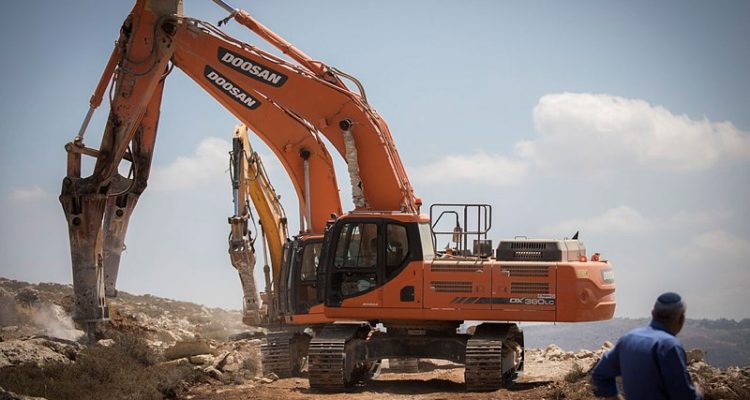The construction is “not an impediment to peace,” Erdan tells the Security Council.
By Mike Wagenheim, JNS
In a rare moment of agreement, the United Nations Security Council called on Tuesday for all parties in the Israeli-Palestinian conflict to “refrain from unilateral actions that further inflame tensions.”
Before Tuesday’s monthly scheduled Security Council meeting on the Israeli-Palestinian file, United Arab Emirates Ambassador Lana Nusseibeh, whose country chairs the council in June, read out a statement compiled following Friday’s emergency closed-door consultations on the increasing violence in the area.
All 15 members of the council, including the United States and Russia, agreed to the language, which “emphasized the obligations and commitments of Israeli and Palestinian authorities to fight and condemn terrorism in all its forms,” as violent clashes continued over the weekend.
Tuesday’s statement referenced a rare, largely symbolic Feb. 20 presidential statement adopted by the council, which condemned Israeli government plans to legalize some “settlement” outposts.
Security Council members “emphasize the obligations and commitments of Israeli and Palestinian authorities to fight and condemn terrorism in all its forms in a manner consistent with international law. They further emphasize the importance of holding accountable those responsible for such acts of violence,” the presidential statement read.
On Tuesday, Nusseibeh added that the council “encouraged additional steps to restore a durable calm and de-escalate tensions, and called on all parties to refrain from unilateral actions that further inflame tensions.”
Tor Wennesland, the UN special representative for the Middle East peace process, told council members during Tuesday’s session that the last two weeks “have been terrible” and that he was “gravely concerned by the escalating spiral of violence.”
He also chastised Israel for what he deemed to be the “relentless expansion of Israeli settlements,” which, he said, “fuels violence.”
No cycle of violence
Gilad Erdan, Israel’s ambassador to the UN, countered that Israeli building permits in Judea and Samaria “are not an impediment to peace, and the building will not stop. Constructing homes in existing communities across Judea and Samaria is not an inflammatory step.”
Erdan added that “Judea and Samaria is the heartland of the Jewish people. We are called ‘Jews’ because we are from Judea.”
He also sought to counter the narrative of a cycle of violence in the region, noting that terrorists murdering Israelis are “as a result of poisonous Palestinian incitement and Israel is taking action to defend itself. There is no ‘cycle!’”
Erdan sought to counter council criticism that the makeup of the current Israeli government is fueling tensions.
“Palestinian terror attacks have been relentless, regardless of Israel’s various governments. Right-wing, left-wing, centrist—it makes no difference to the Palestinians,” said Erdan. “No matter who the prime minister is or who sits in the Cabinet, Palestinian incitement persists and as a result, Palestinian terror persists.”
Robert Wood, the U.S. representative at Tuesday’s session, said he understood the reasons for pessimism surrounding the possibilities for peace after witnessing the events of the last two weeks.
“The violence of the past week must serve as a call for action for all of us in this council to redouble our efforts toward peace,” said Wood. “The United States will continue to work with Israel and the Palestinian Authority to promote steps aimed at lowering tensions and restoring trust, which can create the conditions to bring the parties back to the table.”
At the same time, the U.S. State Department announced on Monday that the Biden administration had increased its support for the United Nations Relief and Works Agency (UNRWA) by $16 million over 2022 levels, bringing total assistance for the year to a record $223 million.
“Regional actors and the broader international community must urgently consider providing UNRWA with greater financial support,” said Wood.
UNRWA serves to keep Palestinian refugees of Israel’s War of Independence and their descendants in a condition of statelessness in perpetuity, and confers upon them a unique refugee status available to no other descendants of refugees anywhere else in the world. The UN agency has been accused by the U.S. and allies of helping to foment the ongoing conflict, and of incitement to violence through the UNRWA school curriculum.
In Tuesday’s council session, Nusseibeh, heavily critical of Israel, remarked, “Last week’s events mark a dangerous escalation, that much is clear. But, we must acknowledge that they represent the logical outcome of a moribund peace process.”
She urged the council to “move beyond the evidently-failed status quo,” with the situation “approaching the point of no return, risking a complete breakdown of any semblance of stability and security.”
Referencing “the specter of the Intifada and the widespread violence that gripped Israel and Palestinian Authority-controlled territory,” Nusseibeh urged the international community to emphasize to the involved parties in the region that “incitement begets incitement, violence begets violence, and security is ephemeral in the absence of justice, rule of law and accountability.”





